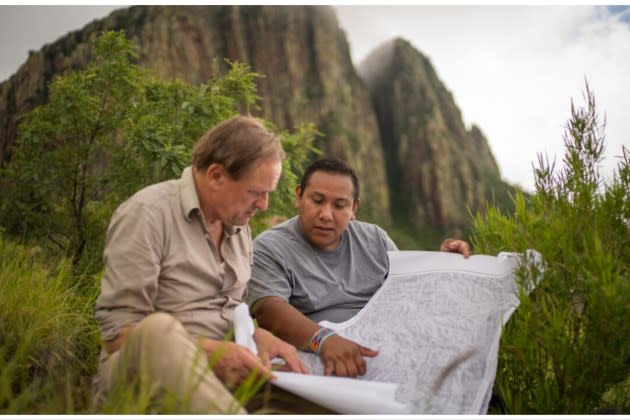CPH:DOX Competitor, Apache Doc Tribute ‘Phantoms of the Sierra Madre’ Added to DR Sales Slate

Danish sales outfit DR Sales, attached to the Sundance Grand Jury Prize winning doc “A New Kind of Wilderness,” has boarded another high-quality Norwegian documentary – “Phantoms of the Sierra Madre” by the multi-awarded Håvard Bustnes (“Raging Grannies,” “Golden Dawn Girls”).
The epic and self-reflective film, made in partnership with the Mescalero Apache Tribe, is due to world premiere in the main DOX:Award competition of Copenhagen’s CPH:DOX festival, running March 13-24.
More from Variety
Bustnes, Christian Aune Falch and Torstein Parelius are producing for Norway’s Upnorth Film, in co-production with Finland’s Napa Films. Executive producers are Bird Runningwater, a high-profile figure from the Cheyenne and Mescalero Apache tribes and former Sundance programmer, key film collaborator Pius Garcia, great-grandson of legendary Apache warrior Geronimo, as well as Upnorth’s Ingrid Galadriel Aune Falch.
In the film, established Danish screenwriter Lars K. Andersen (“The Sommerdahl Murders,” “Flame & Citron”) embarks on a quest to locate a disappeared Apache tribe in Mexico. His odyssey filmed by Bustnes is juxtaposed with rich archive material from Andersen’s childhood hero, Norwegian explorer Helge Ingstad, who himself set out on the same adventure in 1937. Joining the eccentric Dane on his search for the lost Apache tribe is Pius, Geronimo’s great-grandson. Along the way, they encounter a Mexican family who suspiciously claim to be Geronimo descendants, and a Mexican intelligent agent who warns them against their endeavor. Why go on a quest to find a tribe which simply doesn’t want to be found?
Gradually Andersen and the director himself – occasionally in front of the camera – start to wrestle with ethical issues. As westerners and cultural outsiders, do they have the right to dig into the Apache’s past, present and engage in their narrative? Their project gets a further blow when the Danish Film Institute refuses to support it, on the ground of political correctness.
Their filmmaking journey takes an unexpected turn when they make an extraordinary and shocking find in the attic of Ingstad’s house in Norway: Apache sacred relics. The discovery reshapes their narrative, with its loaded truth about white men’s appropriation of indigenous culture and representation. It also gives the filmmaking team a chance to make amends.
Speaking to Variety, Bustnes reckons he was perhaps naïve when Andersen (who was script consultant on three of his earlier films) first approached him with his idea for the film at CPH:DOX 2016. “I would never have thought of cultural appropriation, or anything like that. I felt this could be a great road movie, visually beautiful as well,” he says, mentioning the eventual key contribution from pedigreed cinematographer Lars Skree (“The Look of Silence,” “Putin’s Kiss”).
But being naïve is also perhaps his strength, argues the director, who sees it as a way to stay open, let the magic of documentary filmmaking happen and sometimes uncover – as with this film – unexpected blind spots. “The hard thing is when we think we hold the truth,” Bustnes observes. “In Norway we tend to believe we were always on the right side of history, that we were never wrong – but looking back, it’s easy to see mistakes.“
Turning on Ingstad and his controversial confiscation of Apache relics, Bustnes says the legendary Norwegian explorer “was a humanistic and most certainly loved Apache people, yet he stole their sacred artefacts, and today we know that it was wrong and a show of disrespect for their importance – that’s unquestionable.”
“It’s the same with us filmmakers,” continues Bustnes, who bounces back on filmmakers’ right – or not – to tell certain stories. “There is a big risk that we forget our own blind spots and we need to be aware and honest about that. We need to be more conscious about performing with both caution and respect,” he says.
While admitting that “Phantoms of the Sierra Madre” was perhaps his most difficult and challenging film ever, the director pays tribute to Pius, who kept the project alive. “Pius had the legitimate right to look for his people in Mexico, and he insisted all along to get going. He also spoke to elder Apaches on the Mescalero reservation in New Mexico, who wanted this film. They felt it was important for the next generation who aren’t familiar with the Apache people’s history.”
Until the end, at post-production stage in Finland, Bustnes searched for Pius’ approval to decide, whether or not “Phantoms” could exist. “We did a rough-cut screening with him; I was extremely nervous, but then he said: ‘This is a good movie!’”
A second decisive seal of approval came from the influential Runningwater, who was raised on the Mescalero reservation and has championed indigenous storytelling for more than 25 years. “He said it’s a great film, important to screen to the world. We were honored when he accepted to serve as executive producer,” Bustnes says.
Commenting on DR Sales’ pick up, Kim Christiansen, executive producer, in charge of documentaries and co-productions says: “Håvard is in our opinion a true documentary auteur, with a very progressive film language that always keeps his audience very engaged.”
In “Phantoms of the Sierra Madre,” Håvard is on uncertain ground in a new world order, making a reverse “Borat.” “The modern-day encounter between the two white Scandinavian guys [Bustnes and Andersen] with Native Apache Indians is beyond just a cultural clash,” argues Christiansen, for whom “the meeting peels off many layers of the post-modern discussion of cultural appropriation. We’re so proud of showcasing the film at CPH:DOX and anticipate a lot of hype around it,” he says.
The film was pre-bought by Scandi pubcasters NRK, Yle and SVT, and will launch in Norwegian theaters in September.
Best of Variety
Sign up for Variety’s Newsletter. For the latest news, follow us on Facebook, Twitter, and Instagram.
